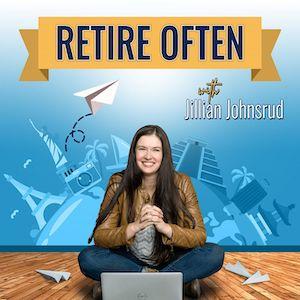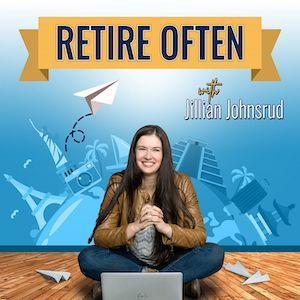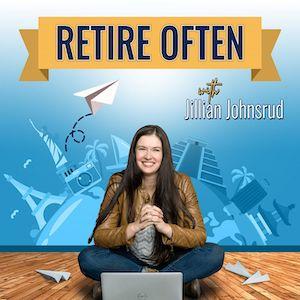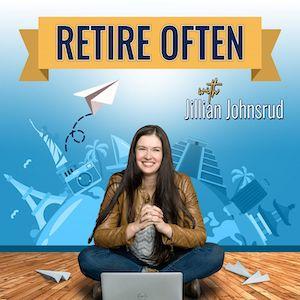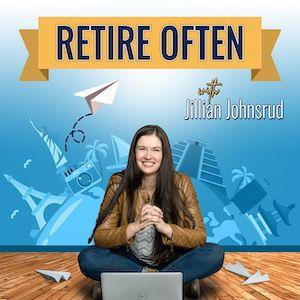Discover Retire Often
Retire Often

34 Episodes
Reverse
28% of doctors consider leaving the profession on a weekly basis. Can mini-retirements allow people to stay in these demanding careers that they love, but are burning them out? Jillian and Christie discuss the importance of taking sabbaticals in the healthcare profession, particularly in light of the burnout culture that often pervades the field. Christie shares her personal journey of feeling overwhelmed in her role as a palliative care physician and the steps she took to reclaim her well-being through a sabbatical. They explore the systemic issues that contribute to burnout, the fear associated with career transitions, and the importance of finding agency and options within the medical field. The discussion emphasizes the need for self-care, the value of coaching, and the significance of maintaining one's identity outside of work. Links: Website: reclaimphysiciancoaching.com, where any physician interested in exploring coaching can book a free introductory conversation. Instagram: https://www.instagram.com/reclaim_physician_coaching Facebook: https://www.facebook.com/profile.php?id=61578579675081 Takeaways: Many doctors feel trapped in their roles due to systemic pressures 28% of doctors contemplate leaving medicine weekly Cultural beliefs can create a false binary of being 'all in' or 'all out' Investing in wellness programs can save healthcare institutions money Fear of losing identity can hinder career transitions Creating a structured sabbatical using the mini-retirement phases can enhance the experience Finding community support can help in navigating career changes
Why take a mini-retirement when you are fully retired? Justin shares his personal journey of taking a six-month adventure around the world, detailing the motivations behind it, the challenges of maintaining routines while traveling, and the appreciation gained from both travel and returning home. They also delve into the financial aspects of long-term travel, debunking myths about costs and emphasizing the importance of planning and flexibility. You'll see how planning a mini-retirement can help break you out of the retirement routine and add extra adventure and experiences to your daily life. Links mentioned: Substack link for coverage of our international 6 month trip Link to our podcast episode with more details about the trip My personal blog where people can get more insight to how I retired at 33 Takeaways Mini retirements can enhance the retirement experience. Traveling for an extended period allows for deeper cultural immersion. Maintaining healthy routines while traveling is possible with planning. Returning home after travel can increase appreciation for everyday life. Long-term travel can be more affordable than living at home. Traveling can help clarify future living and lifestyle choices. Questioning preconceived notions about travel costs can open new opportunities.
Jillian and Chris dive into Chris's seven-month mini-retirement, where he and his wife traveled through Asia and Europe. Chris shares how they structured the trip, from budgeting and planning to navigating without a traditional schedule. He explains the cost advantage of taking a long trip vs many shorter trips to accomplish a long bucket list. And he goes through different hacks to increase income during a mini-retirement and reduce travel costs. We also talked about how his next upcoming mini-retirement will embrace this new season of life with small children. Link to All the Hacks Episode mentioned: Making an Easy $3k/mo from Online Deals with Kai
Jillian and Brenda explore Brenda's journey of taking a mini-retirement to rediscover herself through hiking and writing. Brenda shares her experiences of stepping away from a traditional career to embrace nature and the writing process, discussing the emotional and financial aspects of this transition. They delve into themes of trust, community among hikers, and the importance of redefining success in a personal context. Brenda offers insights on using writing as a tool for self-discovery and provides advice for those considering significant life changes. Takeaways: Brenda took a mini retirement to focus on hiking and writing She set a goal to hike a thousand miles in five months The experience helped her redefine what success means Community among hikers fosters positivity and support Writing can be a powerful tool for self-discovery Avoiding naysayers is important for pursuing dreams More information about Brenda can be found at https://linktr.ee/drbrendau
In this conversation, Jillian and JL Collins explore the themes of financial independence, the value of mini retirements, and the importance of life experiences. They discuss the parable of the monk and the minister, which illustrates the balance between wealth and resilience. The conversation delves into the fears surrounding financial decisions and the journey towards financial independence, emphasizing that experiences in youth may not be as accessible in later years. Through a case study of Tom, they highlight the realities of financial setbacks and the importance of confidence in financial planning. In this conversation, the speakers explore the themes of happiness, wealth, and the importance of optimism in life. Link to Simple Path to Wealth Takeaways The parable of the monk and the minister illustrates financial resilience. Mini retirements can enhance life experiences without a catastrophic financial impact. Life stages affect our preferences and capabilities for experiences. Fear of financial missteps can hinder enjoyment of life. Financial independence doesn't eliminate all financial worries. Experiences in youth may not be as accessible in later years. The journey to financial independence can be as important as the destination. Confidence in financial decisions can be built over time. Case studies can provide valuable insights into financial planning. Happiness can exist independently of wealth.
In this conversation, Jillian and Doug discuss the concept of mini retirements and how they can lead to a fulfilling lifestyle while pursuing financial independence. Doug shares his personal experiences with mini retirements throughout his career, emphasizing the importance of taking breaks, traveling, and spending quality time with family. They explore the challenges and benefits of unconventional choices, the gradual transition to early retirement, and the value of practicing mini retirements to prepare for a fulfilling post-work life. Doug's Links: Niche Site Project: http://nichesiteproject.com YouTube: https://www.youtube.com/@DougCunnington Doug.Show Podcast: https://doug.show Mile High FI Podcast: https://milehighfi.com Homebase: https://dougcunnington.com Instagram: https://instagram.com/dougcunnington
Mitch shares his journey towards a mini-retirement, discussing the challenges of decoupling his identity from work, the role of therapy in his transition, and the planning involved in their adventure. He reflects on the joy of spending quality time with family while traveling and the unexpected return to work with a new perspective. Mitch offers encouragement for others considering a similar path, emphasizing the importance of self-evaluation and planning for a fulfilling life beyond traditional work. Takeaways Mitch and his wife were both working demanding jobs before considering a mini-retirement The financial independence community inspired Mitch to rethink his career path Decoupling identity from work is crucial for a successful transition Therapy played a significant role in helping Mitch understand his feelings about work Planning their mini-retirement adventure was essential to ensure they followed through Living in a camper for 11 weeks brought the family closer together Returning to work allowed Mitch to coach and guide others rather than manage Links: • myFIcapsule Episode #23: Our Big Trip Explained! • EverdayFI Episode #33: Mitch & Meg's Money Musings
Jillian discusses the concept of mini-retirements, exploring how much one needs to save to enjoy these experiences throughout life. She emphasizes the importance of planning, budgeting, and finding ways to increase income or reduce expenses to make mini-retirements feasible. Jillian provides practical calculations and strategies for saving, encouraging listeners to think creatively about financing their adventures and maximizing their experiences. Takeaways How saving an additional 6.5% of your income can fund mini-retirements. Finding ways to increase income or reduce expenses is key to financial freedom. Postponing small luxuries can lead to greater experiences later.
In this conversation, Charles shares the inspiring journey of taking a seven-month mini retirement with his family, exploring the motivations behind their decision, the planning process, and the transformative experiences they encountered along the way. He discusses the impact of travel on his children, the importance of adaptability, and how the trip allowed them to reconnect as a family. Charles also highlights the lessons learned about resilience, the value of pausing in life, and his upcoming book that documents their adventure. Takeaways Travel was a shared dream that started on their honeymoon COVID-19 made them rethink the timing of their trip They aimed for immersion in cultures rather than a packed itinerary The trip was a reset for their family values and connections Children showed remarkable adaptability and resilience during the trip Travel experiences fostered growth and confidence in their kids
In this solo episode, Jillian discusses the necessity of taking mini retirements to engage in meaningful activities that have expiration dates, such as family adventures. Jillian reflects on her own experiences and the unpredictability of life, encouraging listeners to prioritize these moments before they pass by. Takeaways Mini retirements allow for experiences that can't fit into weekends Some life experiences have expiration dates that can't be postponed until 65 Life is unpredictable, and we should seize opportunities when they arise Regrets often stem from not taking chances when we had the time The joy of experiences can outweigh the hassle of planning them As we age, our preferences and abilities change, impacting our adventures
Jacob Wade shares his transformative journey from a high-stress tech sales job to a life of travel and family connection through a mini retirement. He discusses the mental health challenges that led to his decision, the planning and execution of a year-long RV trip with his family, and the profound impact it had on their lives. Jacob reflects on the shift from a corporate career to entrepreneurship, emphasizing the importance of embracing risk and prioritizing personal fulfillment over financial metrics. Takeaways Jacob experienced a mental breakdown due to work stress and travel demands. Jacob's journey highlights the importance of mental health and family connection. He realized he didn't need to reach a financial finish line to make life changes. The FIRE movement can create a mindset that limits freedom vs create it. He learned that life is about the journey, not just financial goals. The risk of staying in a job you hate can be greater than the risk of change. Follow and Connect with Jacob: YouTube.com/@Roadmapmoney Instagram.com/@roadmapmoney threads.net/@roadmapmoney
In this conversation, Stacy shares her experiences part way through her mini retirements. She shares how she created distinct phases. While explaining the importance of having a structured yet flexible approach to this career break. We cover how she overcame one more year syndrome and the fear of losing out on that extra income. Takeaways She felt the need for a better work-life balance due to her stressful job. The group coaching provided valuable support and perspective. Hesitations about leaving a stable career are common but manageable. Volunteering unexpectedly became a fulfilling part of her journey. Flexibility in planning is crucial for a successful mini retirement. Prioritizing rest before tackling new challenges is beneficial. Calculating financial implications helped Stacy make informed decisions.
In this episode, I explain that a month is an ideal starting point due to the ease of negotiation, lower costs, the ability to achieve significant personal goals, and the chance to practice for longer breaks. The conversation then moves into strategies for negotiating time off, emphasizing the importance of a collaborative approach and the recognition that negotiation is often a multi-step process. I then detail the importance of crafting a compelling narrative when negotiating a mini-retirement. She outlines four key elements for framing the story: it should be positive, interesting, specific, and ideally a one-time event. Throughout the discussion, she offers practical strategies for framing the conversation, addressing challenges, and using compromise to create a win-win situation for both employee and employer. You can request access to the 2 free resources to plan an incredible 1-month mini-retirement at http://retireoften.com/onemonth
In this conversation, Jillian speaks with Ken and Mary from The Humble Penny about their journey of taking mini-retirements as business owners. They discuss the impact of COVID on their work-life balance, the transition from corporate jobs to entrepreneurship, and the importance of building systems that allow for freedom in their business. They share insights on the creative energy that comes from taking breaks, the dynamics of family life as business owners, and the mindset shifts necessary for success. TakeawaysL COVID prompted a reassessment of priorities and the desire for more autonomy Transitioning from corporate to business ownership requires discipline and organization Building systems and having a supportive team is crucial for taking breaks It took Ken and Mary four years to achieve the freedom they desired in their business Taking breaks allows for rejuvenation and clearer vision in business Starting with systems in place can prevent overwhelm later on
In this solo episode, Jillian Johnsrud covers one of the tools that she uses with her coaching clients, focusing on the dual skills of courage for change and the capacity to stay and suffer. She emphasizes the importance of developing both skills to navigate life transitions effectively. Jillian provides actionable steps for listeners to clarify their goals and take necessary actions towards change, while also highlighting the significance of building resilience for future challenges.
Frances Benjamin shares her mini-retirement story and the transformative impact it had on her life. Before her mini-retirement, Frances was working multiple jobs and juggling the responsibilities of being a single mom. The catalyst for her decision to take a break was the pandemic and the realization that her daughter would soon be leaving the nest. Frances prepared for her mini-retirement by decluttering, saving money, and paying off debt. She embarked on her break with her daughter, traveling to Mexico and Thailand, immersing themselves in the local culture and enjoying the freedom to do what brought them joy. Unexpectedly, Frances had to return home due to a family emergency, but this experience brought her closer to her father and reinforced the importance of prioritizing family. The mini-retirement allowed Frances to shift her mindset about work, putting herself and her family first. She now values her own well-being and is more selective about the commitments she takes on. Frances encourages other women to take breaks and prioritize their own happiness. Takeaways Taking a mini retirement can be a transformative experience, allowing individuals to prioritize their own happiness and well-being. Family emergencies can disrupt a mini-retirement, but they can also bring family members closer together. A mini-retirement can lead to a shift in mindset about work, with individuals valuing their own well-being and prioritizing family. Frances Links: Ask Me Anything 1:1 Career Break Coaching Tools & Resources
PT, is the creator of a large event, FinCon. Taking a mini-retirement as a business owner can be stressful, confusing, and scary. PT shares his experience of taking a step back from his business and how he slowly extracted himself while empowering his team. He discusses the challenges and transformations he went through during his mini-retirement, including finding new hobbies, spending more time with family, and healing emotionally and spiritually. PT also talks about the expansion of his business after his return, including acquiring another conference and taking over his family's CPA firm. He encourages entrepreneurs to prepare financially, trust their team, and be open to the possibility of a mini-retirement. PT Links: PT Money blog: https://ptmoney.com FinCon Expo: https://finconexpo.com TravelCon: https://travelcon.org CPA Firm: https://taylorassociatescpa.com Takeaways: Taking a step back from your business can be transformative and healing. Preparing financially and having a trusted team in place can make the process smoother. Mini-retirements can open up new opportunities and allow for massive business growth. Being open to new hobbies and experiences can lead to unexpected passions and connections. Entrepreneurs should consider the possibility of a mini-retirement and plan accordingly.
If you have ever been curious about taking an epic yearlong road trip, Heidi's story of how her and her family embarked on a year-long mini-retirement traveling all around the US, will inspire you and give you practical tips for planning. They took an intentional break from work and school, with no W2 jobs and no traditional schooling for their three kids. They experimented with different experiences to prepare, such as traveling in Hawaii for three weeks and renting an RV. These experiments helped them make decisions and prepare for their mini-retirement. They saved enough money to travel for a year, but ended up extending their trip to 15 months. They budgeted for $70,000 to $90,000 but ended up spending around $60,000. (Heidi mentions they spent $45,000 during the interview but let me know it was close to $60,000) They were surprised by how well they got along and how close they became as a family during their adventure. Takeaways Link to Heidi's additional resources: https://ordinarysherpa.com/lifestyle Taking a mini-retirement or family gap year can be a meaningful and impactful experience. Experimenting with different experiences can help in making decisions and preparing for a mini-retirement. Budgeting and saving enough money is important, but it's also important to be flexible and open to unexpected opportunities. Finding joy in everyday novelty and valuing different types of experiences can enhance the mini-retirement experience. Spending quality time together as a family can strengthen relationships and create lasting memories.
Dr. Corey Allen and his wife embarked on a month-long mini-retirement, traveling in an RV and exploring national parks. The idea originated in 2010 when they considered taking their kids out of school and traveling full-time. However, they decided to wait and eventually started taking one month off every summer. Corey is a marriage and family therapist, while his wife is a CPA. Learn how Corey's wife negotiated a month off every summer as part of her contract. Cory maintained his work responsibilities while traveling, and his wife took occasional days off to catch up on work. In this conversation, Corey Allan and Jillian discuss the benefits and challenges of taking a mini-retirement and traveling as a family. They emphasize the importance of framing the experience in a positive way and viewing it as an opportunity for personal growth. They also discuss the normalcy of conflict and the need for space in relationships. The mini-retirements strengthened their marriage and created lasting memories for their family. Cory shares the reactions he has received from friends and family about his lifestyle and encourages others to make intentional choices to create the life they want. They also discuss the value of flexibility and the benefits of traveling with young children. Takeaways Asking for what you want and taking risks can lead to great experiences Maintaining work responsibilities while traveling is possible with proper planning and delegation Mini-retirements can strengthen marriages and create lasting memories for families Frame a mini-retirement as an opportunity for personal growth and positive experiences. Conflict is normal in relationships, and it can be an opportunity to learn more about oneself. Create intentional choices to design the life you want. Flexibility is key in making the most of travel experiences. Traveling with young children can provide valuable learning opportunities.
In this conversation, Brooke Thayer shares her experiences with taking multiple mini retirements and traveling the world. She discusses the inspiration behind her mini retirements, including a difficult divorce that led her to reevaluate her life. Brooke shares the challenges and benefits of open-ended travel, staying in hostels, and finding connections in the travel community. She also talks about the financial aspects of long-term travel and offers tips for affordable travel. Brooke highlights the importance of transitioning from saving to spending mode and gaining agency in making personal choices. Overall, her story serves as an encouragement for those looking to reimagine their lives and pursue their travel dreams. Takeaways Taking mini retirements and traveling can be a transformative experience, providing opportunities for personal growth, self-discovery, and reimagining life. Open-ended travel allows for flexibility and the freedom to explore new destinations and experiences. Staying in hostels and utilizing budget-friendly accommodations can make long-term travel more affordable. Transitioning from saving to spending mode can be challenging, but having a budget and financial plan in place can help maintain financial stability. Taking the leap to pursue your travel dreams requires courage and a willingness to step out of your comfort zone.


